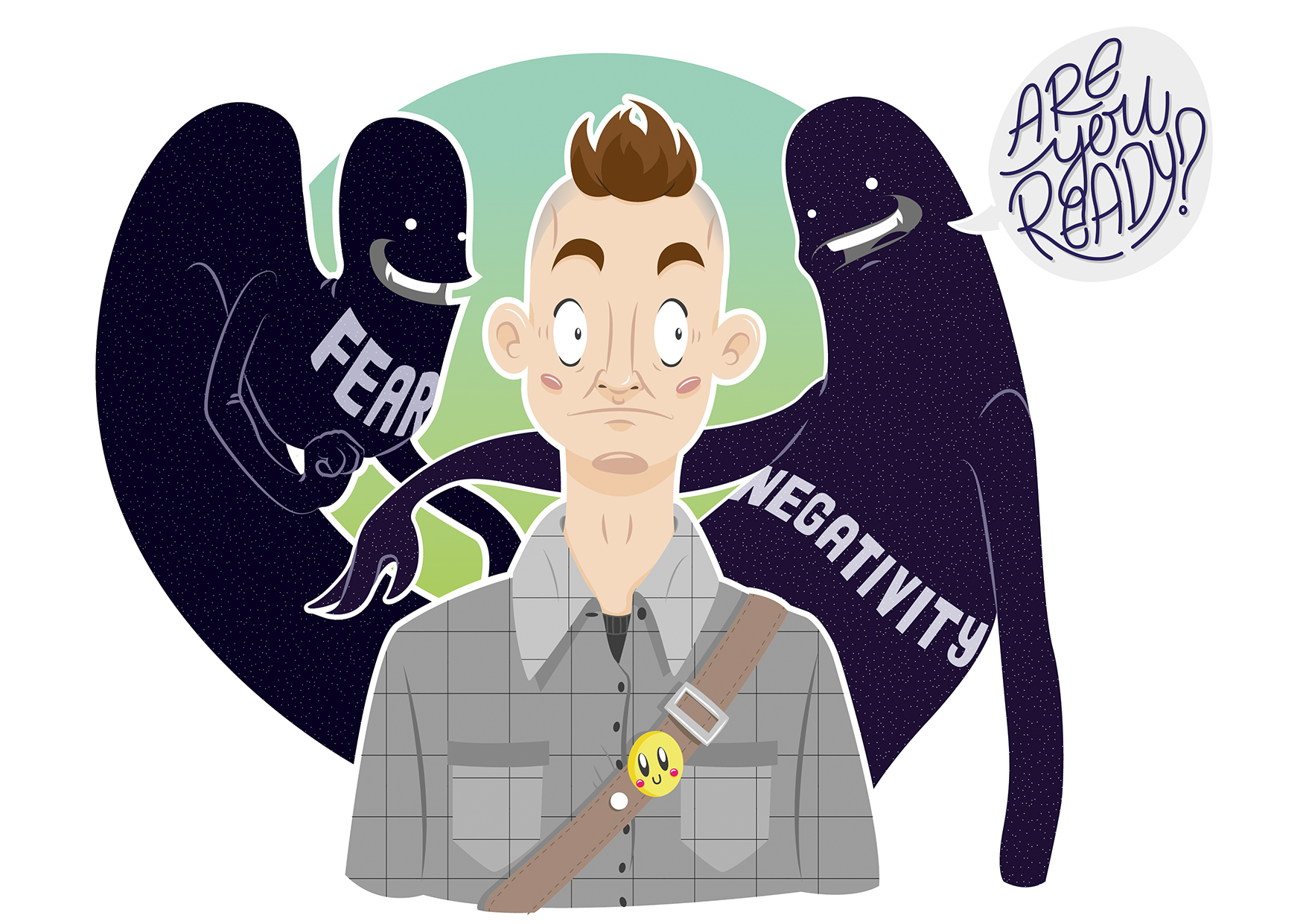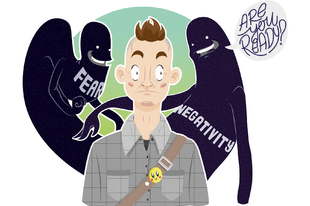In your twenties, you are supposed to be selfish and take everything you have ever wanted. Tinker, experience, learn new things and use your time to expand yourself. Grow into a person who has made the most of his/her possibilities, travel, fall in love, break your own heart – then embrace all of it. However, some of our young fellows encounter serious problems on the rough road that leads to adulthood. Many young adults experience “quarterlife crisis” instead of the adventures that everyone is dreaming of. | Dorina Szabadi

Illusztráció: @iamsuzie_ by Bakos Zsuzsi
The Peter Pan generation
Truth to be told, it is a weird place to be a twenty-something year old person in this world. Literally, I know some girls who are in their early 20s yet work at super fancy institutions dealing with almost classified issues. At the same time, when I look at the chat bar on Facebook, I see my peers who have “xd” as their middle name – and they are at the same age, as us.
Millennials have been born into a digital world that has been revolutionized after the free world had reached out to first world countries. Education now is not a luxury but almost everyone with the reasonable passion and ambition can achieve their goals to at least gain the minimum knowledge in their desired field. We have more opportunities than our parents and grandparents had ever seen. Simultaneously, there are more responsibilities to fulfil our dreams and let’s be honest, their dreams. Nevertheless, since some parts are expanded to an older age – for example we study until an older age – it results in some serious self-evaluation dramas and leads to the dangerous family conversations that question us: “when I was your age, I already had a full-time job”; “at 25, I had children”; “how long do you plan to live on your parents’ back?”; etc.
Anxieties about jobs, unemployment, financial instability, relationship-drama, perfect life, beauty standards, kids at some point… With the broader perspective on our opportunities, life is not lazy to bring some obstacles that can ruin the pretty picture. The pressure is on.
Ugh x 20. Or 20-something.
Don’t get me wrong though – I am pretty sure that all of us are beyond grateful for all these possibilities. Many thanks go especially to the previous generations who have made this all achievable for us. In my perspective, adolescence is overwhelmed with rich heritage we gained from them, but it is hard to decide what to do with it. Maybe we are just trying to figure out what suits us the most. And to be daring and reach out to new challenges can’t be separated from facing a few failures. Although it is up to us and our surroundings how we handle these obstacles – whether we experience them as reminders what to change next time, or if we or our beloved ones judge them as mistakes that can bitter our lives.
Panic at the disco
Here comes the threatening phrase “crisis”. All those who believe that the natural cycle of becoming an adult, which is hardened with difficulties along with it, is too much of a stress, become victims of quarterlife crisis. Similar to the midlife crisis that affects the forties, young adults ranging from the 20 to 30 years old people begin to feel doubtful about their own lives after they enter the “real world”. Common symptoms of this phase are depression, isolation, feeling lost and scared of expectations and not fitting the norms that our families or the society as a whole enforce.
Chasing a career versus resting in the parking lot
It is important to highlight that the struggle is not invincible and despite self-reflections that deny the fact, most of us go through it. Many solid, empirical researches show that around this coming of age period in some way everyone is experiencing insecurities and disappointments. A survey found that 86% of 1100 young people feel under pressure to succeed in their relationships, finding a job and financial stability. Also, if you think about how many friends of yours are planning to leave the country because of difficulties about pursuing a satisfactory life at their own home, you may realize: it is not only a romantic getaway but also an urge to free themselves from the pressure and tension they think couldn’t be solved locally.
Professionals define two types of young adults who enter the quarterlife crisis. The first is always on the run, collecting all his strength and energy to pursue his one and only goal: to become the best in his battles. This young person receives his first diploma – three or five years in higher education with all the best grades that reflect his time he’d put in all those projects done together with his classmates. Therefore, he leaves school and enters the market with great joy and enthusiasm. He knows there will be challenges. He actually looks forward to them. Yet, after a few years of unfulfilled desires and unexpected surprises, his world changing plans are smashed to little pieces. His enthusiasm has faded, he doesn’t trust the adult world as much as he used to. He realizes, the world is not that easy to be changed. These people put the job first, they say that relationships can wait; first, they want to build a secured lifestyle. This means they shoot for the high position jobs that require lot of sacrifices and to be always in your peak form. Media also paints a picture where it is about you, how you perform at your workplace, if you will be a star or a loser. Of course, nobody wants to be a loser, therefore these people will always chase the idea but lose their positivity in the process. They will be trapped in the fear of performance. Remember, there are steps to take for all of us. You can take two at a time, but before you would reach the floor, your legs will tie down and eventually you’ll find yourself lower than you started. All I want to say is: don’t rush yourself and certainly don’t compare yourself to others’ achievements. Your biggest competitor is yourself, so take your time and do a bit better than you did last time. Expectations are okay as long as they are only guidelines, otherwise you’ll find yourself losing creativity before actually succeeding and asking: What have I done so long? I have nothing to show.
Another type is when the young person acts entirely the opposite of the active, pursuing peer. This one chooses passivity. He is already fed up with the expectations and the constant drift for success, so he decides to not enter the job market. He postpones the decision because he’s not satisfied with himself and the world, he doesn’t feel to commit or take responsibilities. There are so many tasks to be done that he refuses to even start them. Adulthood seems like a too complicated and complex life that is a hopeless mission to accomplish. How could it be possible to have two degrees, a well-paying job and a family to maintain before you hit 30?
From individual to a social creature
There are seven bugaboos that are further hardships we could use our own expecto patronum against. A phenomena, like success gained too early, or being the first intellectual in the family are inconveniences that make quarterlife crises even more unbearable. Overwhelming options make young people feel like they are unsuitable for the job market or our own network may let us degrade ourselves if we experience the fear of missing out. All this can be prevented, if you try yourself as an intern during your college years. You’ll get acquainted with your own and the job market’s expectations which helps you decide later when it comes to self-realization. Also, not following the current trends might sound a bit deviant but consider your interests over money when choosing major. Furthermore, create strong relationships with your peers and colleagues as a friendly environment releases the stress. Fear not, even if you can’t prevent to face panic, it is not a tragedy to experience the rugged transition. The first crisis you are going through right now – or you will be – has four stages that eventually can become a positive experience.
Wait, #confused.
Phase 1: You feel trapped either in a relationship or a job. You lost all your positivity, energy and creativity. You’re tired of being tired. You feel like you can’t leave, although you know it’s inevitable.
Phase 2: You already realize you are in a bad place so you like to play with the idea of escaping from it. You have a good day here, a bad one there. New interests grasp your attention.
Phase 3: You actually do something. Like you get up from bed, and apart from putting clothes and the hard activity of feeding yourself and your cat, you start getting active. You face proactive changes as you rebuild your life.
Phrase 4: Yes, the bill at the end of the month will come. Yes, it will be a lot. But at the same time, you realize, it is just a part of life, you put yourself together, have friends to cry on their shoulders and most importantly to share the good vibes with. Responsibilities and commitments go with giving up a few things but they’re worth it.






